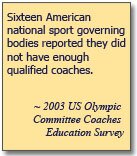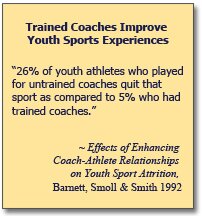The Institute for Sport Coaching recognizes that there is a unique body of knowledge vital to enabling sport coaches to effectively perform their many roles. Formal coaching education programs are a primary tool for transferring such information to new and developing coaches, while also ensuring that practicing coaches acquire and maintain the critical knowledge and skills standards set by their respective organization’s leadership.
A dedication to creating quality trained sport coaches benefits participating communities in many ways, including:
- Keeping youth involved in sport and physical activity.
- Increasing the number of coaches and improving retention rate
- Raising confidence level of coaches and increasing information-sharing/networking
- Delivering positive and safer sports experiences to America’s youth
- Reducing legal liabilities associated with sport
 Keep More Youth “In the Game”
Keep More Youth “In the Game”
- Studies have found athletes who played for untrained coaches led to an attrition rate of 26%; whereas those athletes play for a trained coach resulted in a drop out rate of only 5%.
- Additional studies show a positive impact on self-esteem for athletes under 12 years old playing for a trained coach.
- Sport is the most popular form of physical activity for many children.
Improve Recruitment & Retention among Youth Sport Coaches
- One study indicated that 85% of youth sport coaches prefer to
 coach in a league that requires training and 72% feel encouraged to continue coaching through mandatory training.
coach in a league that requires training and 72% feel encouraged to continue coaching through mandatory training. - Other studies indicate coaching education programs encourage new coaches to get involved by reducing the barrier created by a lack of confidence in the skills and abilities needed to coach.
Raise Coaches’ Confidence & Increase Information Sharing
- Coaches reported in one study that participating in a coaching education program increased information sharing among their peers and aided them in creating a support network of fellow coaches.
- A study of coaches attending a youth coaching course indicated coaches increased the confidence they held regarding their coaching.
Provide Safer Sports Experiences for Youth

- Both the U.S. Departments of Education and Health & Human Services acknowledge better-trained coaches help to reduce sports-related injuries by applying risk-management practices which aid in identifying potential hazardous conditions before they threaten athletes.
Reduce League Legal Liability
- Legal precedents indicate that trained sport coaches are easier to defend against accusations of negligence.
NOTE: All reference material available upon request.
For more information regarding why we should train our sport coaches, please download our white paper on the “Value of Quality Trained Sport Coaches.”
Please share this information with your friends, neighbors, school administrators and local officials. You can download a PDF version of this page here.
To assist sport administrators and leaders, the Institute has developed a factsheet to assist you in choosing the right coaching education provider for your sports organization.
Please contact Christopher Hickey, Executive Director, Institute for Sport Coaching (978-201-1024 or ).






 ISC's quarterly email newsletter
ISC's quarterly email newsletter RSS
RSS